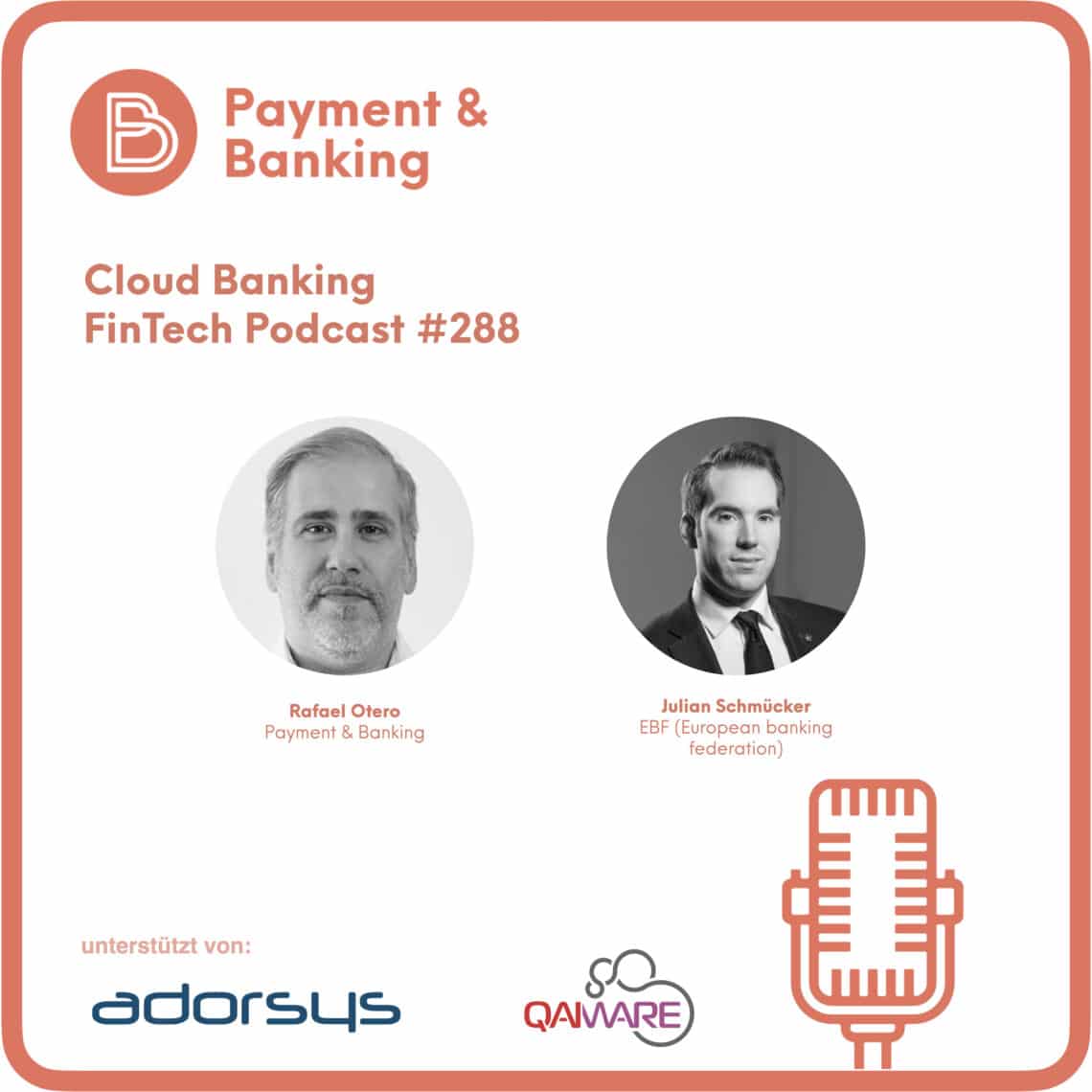FinTech Podcast #288
Die Digitalisierung von Dienstleistungen und die Globalisierung haben zu erheblichen Veränderungen der Methoden der Datenerhebung, des Zugangs und der Nutzung von Daten geführt. Insbesondere im Bankgewerbe.
Dies hat in letzter Zeit zu einem verstärkten Interesse an Cloud Computing als Mittel zur Unterstützung der Digitalisierung von Finanzdienstleistungen beigetragen. Dabei geht es nicht nur um die Speicherung von Daten in der Cloud, sondern auch um die Auslagerung Ihrer Rechenleistung entsprechend den Geschäftsanforderungen. Auf diese Weise können Cloud-basierte Infrastrukturen eine treibende Kraft für eine bessere Softwareleistung, Datenanalyse und neue Technologien wie distributed ledgers und künstliche Intelligenz sein. Cloud Computing treibt sowohl die digitale Transformation der Banken als auch den digitalen Binnenmarkt der EU voran.
Allerdings haben Banken im Vergleich zu anderen Branchen aufgrund des strengen regulatorischen Umfelds, in dem sie tätig sind, Cloud-Dienste bisher eher verhaltend in Anspruch genommen. Dementsprechend schränken rechtliche und regulatorische Einschränkungen die Einführung von Cloud-Diensten im Bankwesen ein, aber auch der Mangel an harmonisierten Regulierungsansätzen in verschiedenen Rechtsordnungen und zwischen den Regulierungsbehörden trägt zu einer hohen Schwelle bei.

Darüber hinaus ist die Nutzung, Verwaltung und Speicherung von Kundeninformationen mit höheren Compliance-Risiken verbunden, insbesondere in einem internationalen Umfeld und im Hinblick auf Daten- und Sicherheitsrichtlinien (z.B. GDPR bzw. DSGVO).
Die Vertragsverhandlungen zwischen Banken und Cloud-Service-Providern (CSPs) sind mit erheblichen Reibungsverlusten konfrontiert.
Cloud Computing gibt es mittlerweile in vielen Formen (privat, öffentlich, hybrid). Öffentliche Cloud-Lösungen ermöglichen es Service Providern, Ressourcen wie Anwendungen und Speicherplatz über ein zugängliches Netzwerk zur Verfügung zu stellen, in dem mehrere Kunden die gleichen Ressourcen gemeinsam nutzen können. Eine Hybrid-Cloud ist ein integrierter Cloud-Service, der sowohl private als auch öffentliche Clouds nutzt, um unterschiedliche Funktionen innerhalb derselben Organisation zu erfüllen.
Diese Formen können über verschiedene Servicemodelle bereitgestellt werden.
Der Weg zur Cloud-gesteuerten Organisation führt über die alte Infrastruktur hinaus und kennt mehrere Phasen. Da Banken das innovative Potenzial der Cloud-Technologie nutzen möchten, berücksichtigen sie Risikomanagement und Organisationsstruktur.
Rafael hat sich diesmal einen echten Experten auf dem Gebiet des Cloud Bankings in den Podcast eingeladen. Zusammen mit Julian Schmücker, dem Senior Policy Advisor der European Banking Federation (EBF), sprechen sie darüber wo wir beim Cloud Banking stehen, was echte Stolpersteine sind und natürlich die wichtigste Frage von allen – bekommen wir eine Harmonisierung der Regulatorik zum Thema Cloud Banking hin?

Das EBF Cloud Banking Forum ist ein einzigartiger Versuch, einen Dialog zwischen den zuständigen Behörden, Anbietern von Cloud-Diensten (CSPs) und Banken zu schaffen, um die Schaffung eines harmonisierten Aufsichtsansatzes für Cloud Computing zu ermöglichen und die rasche Einführung von öffentlichen/hybriden Cloud-Lösungen im Bankensektor zu unterstützen.
In ersten Arbeitsabläufen erstellte das EBF Cloud Banking Forum drei technische Papiere, die wichtige Aspekte für die Einführung von Cloud Computing durch europäische Banken widerspiegeln. Durch die Unterstützung eines harmonisierten regulatorischen Rahmens durch die Anregung freiwilliger Best Practices und die Bereitstellung eines pädagogischen Hintergrundes versuchen die Anbieter von Cloud-Diensten und die europäischen Banken, eine nachteilige Fragmentierung des Cloud-Computing in der EU zu vermeiden.

Zu diesem Zweck reflektieren die Papiere die Besonderheiten der Cloud-Nutzung durch Finanzinstitute und behandeln die Anforderungen der EBA-Leitlinien zur Auslagerungsregelung aus einer Cloud-spezifischen Perspektive.
Ein echter Deep-Dive Podcast für alle technikverliebten unter euch. Diesmal ausnahmsweise in englischer Sprache!
Wir danken unseren großartigen Sponsoren

&

Wenn es Euch gefällt, abonniert den Podcast doch bei Soundcloud, Spotify und iTunes und bewertet diesen mit 5 Sternen
⭐️⭐️⭐️⭐️⭐️
Abonnieren: Die verschiedenen Podcast-Formate (#Ask Me Anything, #NewsPodcast, #5PMClub) von paymentandbanking.com könnt Ihr auf allen wichtigen Podcast-Plattformen hören. Zum Beispiel bei Apple Podcasts, Google Podcasts, Castbox, Deezer, Podimo, Overcast, PlayerFM, Spotify, SoundCloud oder auch als RSS-Feed abonnieren.




